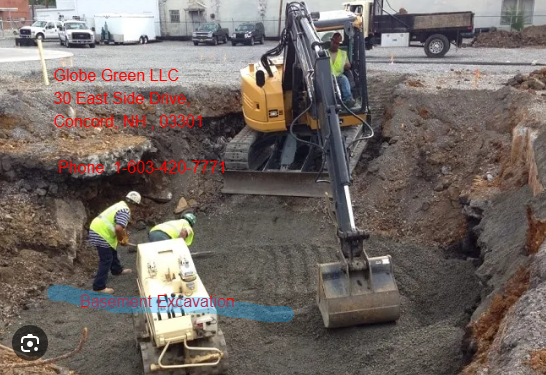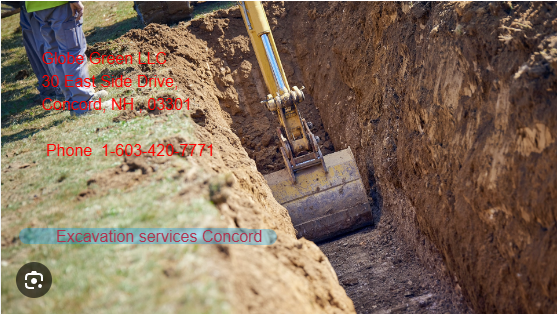Introduction
When you think about construction, what comes to mind? Maybe it's the towering skyscrapers or cozy homes that dot our landscapes. But before any of these structures can rise, there’s a crucial step that often goes unnoticed: excavation. This process lays the groundwork for everything else.
In this comprehensive guide, we’ll explore "Understanding the Timeline of an Excavation Project from Start to Finish." Whether you're looking to hire excavation contractors in Concord NH or simply want to understand more about excavation companies near me, this article is your go-to resource. We’ll delve into every detail—from the initial planning stages right up until the final touches—and give you insight into what makes a successful excavation project.
What is Excavation?
Excavation is the process of moving earth, rock, or other materials from one location to another using tools, machinery, or explosives. It’s not just about digging holes; it involves careful planning and execution.
Types of Excavation Projects
Residential Excavation Commercial Excavation Trenching Basement Excavation Site Preparation for LandscapingEach type has its own unique challenges and requirements, especially when it comes to timelines.
The Importance of Planning in Excavation Projects
Planning is paramount when embarking on an excavation project. A well-laid plan can save time and money, ensuring everything proceeds smoothly.
Key Elements of Effective Planning
- Site Assessment: Before any digging occurs, you need a thorough assessment. Permits and Regulations: Navigating local regulations is crucial. Budgeting: Know your budget inside out. Hiring Professionals: Choosing the best excavation company in Concord NH can make all the difference.
Understanding the Timeline of an Excavation Project from Start to Finish
Now that we’ve set the stage, let’s dive into what typically happens during an excavation project. Generally speaking, the timeline can be broken down into several phases:
1. Pre-Excavation Planning (1-2 weeks)
- Site Survey
Before any heavy machinery rolls onto the site, a detailed survey must be conducted.
- Soil Testing
Understanding soil conditions helps determine what equipment will be needed.
2. Permitting and Approvals (2-4 weeks)
- Obtaining Necessary Permits
This step can vary dramatically based on location but is crucial for legality.
- Community Engagement
Sometimes engaging with local communities might be necessary if your project impacts them.
3. Mobilization (1 week)
Once permits are secured, it's time to mobilize equipment and laborers to the site.
- Equipment Setup
Heavy machinery like excavators and bulldozers must be transported and set up correctly.
4. Excavation Process (2-8 weeks)
This phase includes several steps:
- Clearing
Removing vegetation and debris is essential before digging begins.

- Digging
The actual excavation will take place here—this could involve different types based on your needs (e.g., basement excavation).
5. Backfilling and Compaction (1-2 weeks)
After excavation, backfilling may be necessary depending on what follows next in your construction plans.
6. Site Restoration (1 week)
Cleaning up after an excavation isn't just about leaving a tidy site; it's also critical for local ecosystems.
7. Final Inspection (1 week)
Finally, inspections ensure everything was done according to code and specifications before moving forward with construction.
Factors Affecting Timeline Duration
The timeline isn’t always straightforward—it can shift due to various factors:
- Weather Conditions
Rainy days can halt progress indefinitely!
- Soil Issues
Unforeseen soil problems may require additional tests or remedial action.
- Unexpected Discoveries
Archaeological finds or underground utilities can complicate matters significantly.
Choosing the Right Excavation Company
Selecting an experienced contractor like Globe Green LLC is essential for a smooth process.
ol2li10li10/li11li11/li12li12/ol2/## Common Challenges Faced by Excavators Every project has its hiccups! Here’s what you might encounter: - Underground Utilities
Finding out too late that there are pipes or cables underneath can lead to delays!
- Tight Deadlines
Rushed jobs increase risk factors dramatically; proper scheduling alleviates this pressure!
FAQs About Excavation Timelines
Q: How long does a typical residential excavation take?

Q: What should I look for when hiring excavation contractors?
A: Check their reputation through reviews! Ask about previous projects similar to yours!
Q: Is it common for timelines to change?
A: Absolutely! Factors like weather conditions or unforeseen land issues often cause delays.
Q: Do I need permits for small-scale excavations?
A: Yes! Always verify local regulations first—better safe than sorry!
Q: How does soil condition affect my project timeline?
A: Poor soil conditions may require extra testing which adds time; solid ground speeds things along!
Q: Can I supervise my own excavation work?
A: While you can observe operations closely; having licensed professionals ensures safety & compliance!
Conclusion
In summary, understanding the timeline of an excavation project from start to finish involves multiple stages filled with intricate details that demand attention at every turn! From pre-excavation planning through completion stage inspections—there's much more than meets the eye when it comes down below ground level!
Choosing reliable partners like Globe Green LLC ensures success while navigating complexities inherent within such ventures successfully—keeping everything running smoothly without overlooking vital aspects along way!
So next time you see heavy machinery rumbling past your neighborhood remember there’s always a story behind those digs—one rooted deeply within meticulous planning efforts setting foundations upon which dreams rise high above us all!